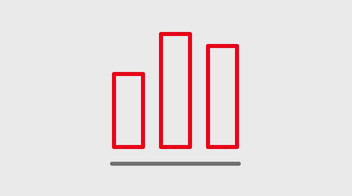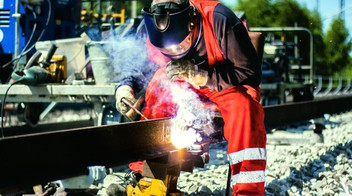Development in the year under review
- Demand trend more or less stable despite increasing station charges.
- Leasing business continues to recover after Covid-19-related restrictions.
- Impact of energy-saving measures compensate in part for increasing energy prices.
- Measures to improve quality and customer satisfaction continue to be implemented.
DB Netze Stations | 2023 | 2022 | Change | |
absolute | % | |||
Passenger stations | 5,399 | 5,401 | –2 | – |
Facilities quality 1) (grade) | 2.77 | 2.77 | – | – |
Customer satisfaction, traffic station (passengers/visitors) (grade) | 2.5 | 2.4 | +0.1 | – |
Customer satisfaction, traffic station (train operating companies, contracting organizations and Federal states)(grade) | 2.8 | 2.6 | +0.2 | – |
Customer satisfaction, tenants (grade) | 2.2 | 2.1 | +0.1 | – |
Station stops (million) | 155.6 | 155.9 | –0.3 | –0.2 |
thereof non-Group railways | 47.1 | 44.6 | +2.5 | +5.6 |
Total revenues (€ million) | 1,449 | 1,384 | +65 | +4.7 |
thereof station revenues | 1,020 | 996 | +24 | +2.4 |
thereof rental | 377 | 350 | +27 | +7.7 |
External revenues (€ million) | 662 | 593 | +69 | +11.6 |
EBITDA adjusted (€ million) | 20 | 195 | –175 | –89.7 |
EBIT adjusted (€ million) | –150 | 29 | –179 | – |
Gross capital expenditures (€ million) | 1,595 | 1,434 | +161 | +11.2 |
Net capital expenditures (€ million) | 505 | 397 | +108 | +27.2 |
Employees as of Dec 31 (FTE) | 7,786 | 6,997 | +789 | +11.3 |
| Employees annual average (FTE) | 7,389 | 6,972 | +417 | +6.0 |
Employee satisfaction (SI) | – | 4.0 | – | – |
Share of women as of Dec 31 (%) | 44.4 | 44.0 | +0.4 | – |
Absolute primary energy consumption (stations) compared to 2010 (%) | –34.3 | –30.6 | –3.7 | – |
1) Preliminary figure.
Facilities quality remained stable.
Customer satisfaction of passengers and guests declined somewhat. The survey is conducted on the basis of about 80,000 interviews per year. Customer satisfaction among tenants remained at a high level, but was down slightly on the previous year. Customer satisfaction among train operating companies, contracting organizations and Federal states also declined.
Station stops were almost at the previous year’s level despite construction and strike-related restrictions. Positive effects from increased traffic on non-Group railways were more than offset by declines on intra-Group railways.
Economic development was significantly weaker. Although revenues grew significantly, greater increases in expenses led to a significant decline in operating profit figures, partly as a result of the implementation of additional measures to increase quality. Price increases, including for energy, also had a negative impact. As a result, adjusted EBIT was clearly negative.
The continued recovery in the rental business and price effects fueled the positive income trend:
- Revenues (+4.7%/€ +65 million): Growth can be attributed in particular to a continuing recovery in the rental business following Covid-19-related losses and to a dynamic, price-related increase in station fees. This was driven by non-Group customers due to the takeover of transport services.
- Other operating income (–7.3%/€ –16 million): Significant decline. In particular, lower grants in connection with funding programs for the renovation of stations (discontinuation of special programs from the previous year) were partially offset by growth in the marketing of advertising space.
On the expenses side, there were noticeable additional burdens, particularly in cost of materials:
- Cost of materials (+16.4%/€ +123 million): The significant increase was mainly due to higher expenses for project-related maintenance (mainly prefinancing) as well as measures to improve the quality of our stations. Higher energy expenses due to price and volume effects (partially offsetting effects from the electricity price brake are reported in the extraordinary result) had an additional negative effect.
- Other operating expenses (+18.9%/€ +57 million): The significant increase was mainly due to the Group charges introduced in 2023 and increased expenses for IT projects. In addition, a further increase in travel activity and price-related higher rental expenses for vehicles and office space led to additional burdens.
- Personnel expenses (+11.6%/€ +55 million): Significant increase as a result of a higher number of employees and as a result of collective bargaining agreement.
- Depreciation (+2.4%/€ +4 million): Capital expenditure-related increase.
Gross capital expenditures increased significantly, mainly as a result of the modernization of existing stations, the construction of new stations and the prefinancing of Government measures. Increased construction costs also had an impact. With higher investment grants, net capital expenditures increased less significantly.
The number of employees increased as a result of additions, particularly in the areas of construction and facilities management, to allow the increased volume of capital expenditures to be realized.
The share of women has increased slightly from a relatively high level.
The positive trend continued with a further reduction in absolute primary energy consumption at stations compared to 2010, partly due to the use of energy-saving technologies such as LED applications for lighting systems.


